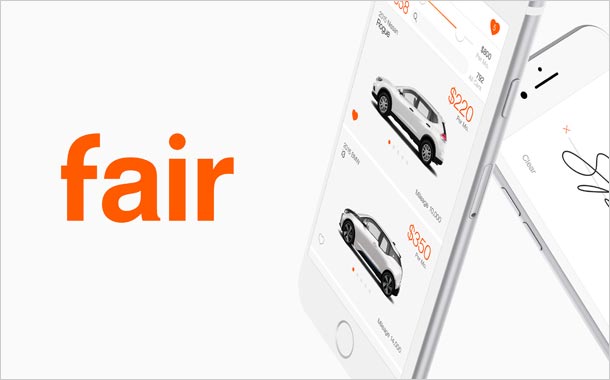By Alysha Webb – Editor and Publisher
Fair is a mobile phone app that, according to the company’s press release, “frees consumers from the long-term commitment and higher cost of traditional ownership.” The app allows users to view inventory, see a range of monthly payments, and close the deal – all on their mobile phone. All the vehicles listed are currently pre-owned, including Certified Pre-Owned and non-CPO.
The new “owner” then drives the vehicle for as long as he or she desires and turns it back in with only five days’ notice. About as commitment-free as possible.

Georg Bauer
Started by TrueCar founder Scott Painter and Georg Bauer, an executive with more than 30 years experience in automotive finance with companies including BMW, Mercedes-Benz, and Tesla, Fair’s funding comes from BMW i Ventures, Penske Automotive Group, and various strategic investors.
Automotive Buy Sell Report editor Alysha Webb sat down with Fair president Bauer and Fair manager of corporate strategy Eva Kellershof at the Fair headquarters in Santa Monica’s Silicon Beach neighborhood to discuss, among other topics, the role of dealerships in Fair’s business model.
An edited version of the interview follows.
ABSR: How many dealers are you currently working with and what is the dealership’s role in the Fair business model?
Bauer: We started in September [of 2017] and we’re working with more than 300 dealers now.
This industry is in the most dramatic transformation in transportation history. It is mind-boggling what is going on. It was always about the car – bigger, better, faster, more, and more markets. Now it is about game-changing.
I am a 35-year industry veteran. I am very adamant, I won’t deny my automotive past. It has been too fun of a ride. We are now determining a way of completely disrupting the buying process while partnering with the dealers. We wanted to disrupt the process that a majority of consumers don’t’ like – the car buying process. How can we introduce technology at the point of sale for a completely consumer-centric process all on your phone but work with dealers?
I believe dealers continue to have a vital role… but the dealers have to change. The dealers we are working with have come to realize exactly that. The efficiency in the back office can be digitized.
Dealers have done a fantastic job as a customer touch point. We are building a bridge from the dealer to the consumer via digital technology. That is the Fair app.
ABSR: If the entire process takes place on a mobile phone, where does the dealer come in?
Bauer: Even though the customer interaction takes place on a phone, the dealer is still selling the car—not to the customer, but to us. That way, when a customer comes in to pick up the car, the dealer can spend time explaining the car rather than inundating the customer with paperwork. Millennials hate the buying process. Most of the dealers we are talking to are saying “this is good, I like it.”
We [the industry currently] force consumers into a 60- or 72-month loan for a depreciating asset. We said this is not adequate. It takes the consumer out of the dealership for too long of a time. Flexible ownership means the dealer gets the consumer back two, if not three times, compared to current situation of at least 48 months.
ABSR: How does the dealer get the consumer back?
Bauer: Because Fair offers flexible ownership. We assume an average hold period of 18 months. That’s a guess, of course.
The Fair monthly payment includes roadside assistance, a maintenance plan, even optional insurance. If the manufacturer warranty falls off, we come in with an extended warranty. In the Fair contract, the customer has to return to the dealer for all the related work to keep the car going.
ABSR: How do dealer’s margins compare in a Fair deal with a used car deal without Fair?
Bauer: Margins differ across makes and models, mileage. It is between 4 and 6 percent. We have a link to the DMS, we feed on a current basis and the inventory is uploaded into our algorithm to check what is a fair, qualifying price.
ABSR: Under your business model, Fair buys the car the customer chooses from the dealer, right? How does Fair make money on these transactions?

Eva Kellershof
Kellershof: We do not extend a loan to the customer, so we do not have to charge as much. We are able to tap into Wall Street banks [for financing], and also through securitization that allows us to get the money to buy our portfolio at much lower rates than a dealer has so we have that advantage as well.
Bauer: We have continuous equity sources.
Kellershof: Our ability allows us to only have flooring for cars that actually make money instead of financing assets that are standing around.
ABSR: What if someone returns a car right away? Don’t you take loss on that?
Bauer: We are not a rental company; we don’t want to be looked at as a rental company. The start payment, on average, equals three monthly payments. You forgo that if you return the car. We create something of a disincentive [to returning the car in a shorter period].
ABSR: Fair could end up holding a bunch of used cars – what do you do with them?
Bauer: The dealer gets the first opportunity to buy back the car. If that doesn’t happen within 24 hours, we offer it to the entire network of dealers for the next 48 hours. After that, we sell it at auction. We work with Manheim.
The liquidity in the used car market is there. We don’t have to reinvent this process.
ABSR: So, if I am a dealer why should I work with Fair?
Bauer: Because you get a better customer experience, happier customers, greater loyalty, better velocity into your used car business, more efficiency with the F&I process going electronic. And you control the price. We are not getting involved with the pricing.











